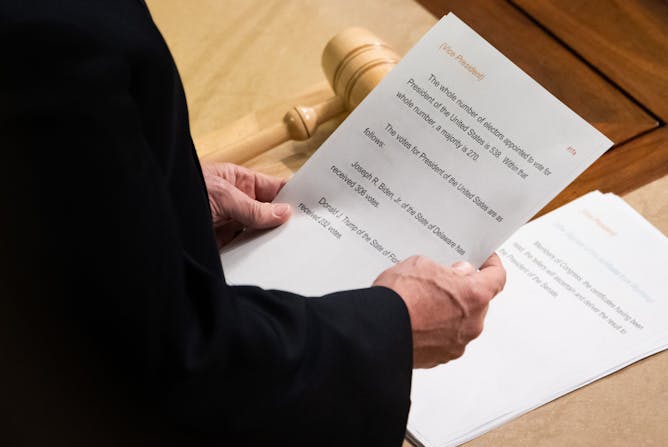|
You’d think that counting votes in a presidential election would be a simple thing.
But “presidential elections in the U.S. are complicated,” writes election law scholar Derek Muller, and voters don’t directly elect the president. One complicated element of that indirect vote is the Electoral Count Act, an 1887 law passed after a disputed election to streamline Congress’ process of counting and certifying who has won the presidency. In recent years, including the 2020 election, the act has shown its weaknesses – prominent among them is the ability of lawmakers to object for spurious and partisan reasons to vote counts.
“These objections have undermined confidence in the outcome of presidential elections,” Muller writes. He walks readers through the basics of the Electoral Count Act and how it can be fixed, noting that such reforms lend themselves to bipartisanship. In the end, Muller says, with reforms to the Electoral Count Act, “Congress cannot prevent all mischief, but it can reduce the possibility of mischief in the future.”
Also today:
|

Vice President Mike Pence reads the final electoral vote counts declaring Joe Biden the next U.S. president during a joint session of Congress at the U.S. Capitol on Jan. 7, 2021.
Saul Loeb/AFP/Getty Images
Derek T. Muller, University of Iowa
Concerned about problems in counting Electoral College votes that determine the next president, lawmakers are considering changes to the Electoral Count Act. What is the act, and what’s wrong with it?
|
Environment + Energy
|
-
Christine E. Hatch, UMass Amherst
Beavers in our landscapes have great potential to provide small-scale adaptations to climate change – if humans can figure out how to live with them.
|
|
|
|
Education
|
-
Jamaal Abdul-Alim, The Conversation; Alvin Buyinza, The Conversation
Several scholars weigh in with tips on how to support college students’ emotional well-being during the pandemic.
|
|
Health + Medicine
|
-
Abubakarr Jalloh, Hollins University
Addressing racial and ethnic health gaps is becoming even more important as the US population continues its shift toward a minority-majority nation.
|
|
Politics + Society
|
-
Michael J. Saks, Arizona State University
Brown v. Board didn’t overrule ‘separate-but-equal’ but it had that end. A law scholar explains how there is a lesson there for conservatives on today’s Court looking to end abortion in the US.
|
|
Science + Technology
|
-
Dare A. Baldwin, University of Oregon
When researchers look at CCTV footage of how people really react during earthquakes – as opposed to what they report after the fact – it looks like alerts aren’t yet inspiring protective action.
-
Sung Han, University of California San Diego; Shijia Liu, University of California San Diego
Opioids can cause death by slowing breathing to dangerously low levels, or stopping it altogether. Examining one area of the brain may eventually lead to safer painkillers.
-
Ellen Peters, University of Oregon; Pär Bjälkebring, University of Gothenburg
Compared to people who aren’t as good at math, people who are better at math are more happy when they have high incomes and less happy when they have lower incomes.
|
|